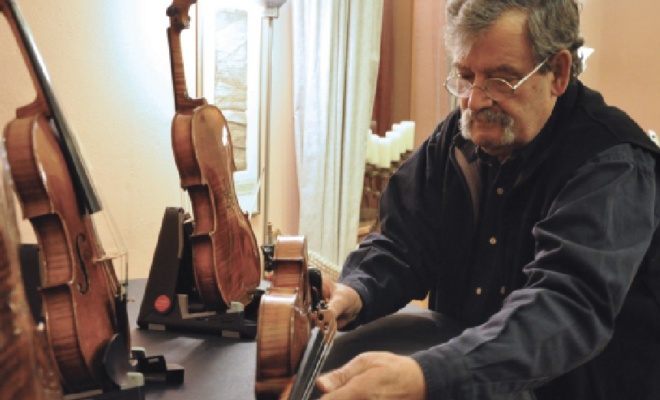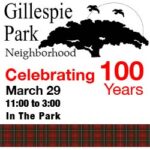
Feature
Violins of Hope
Rare Instruments Bring Stories of the Holocaust to Life
The Jewish Federation of Sarasota-Manatee (JFED) is bringing a very special series of events to Sarasota this season with Violins of Hope February 1 through 16. The events feature violins, lovingly restored by an Israeli luthier, that were played by Jewish musicians during the Holocaust. The community will have the opportunity to experience the beauty and poignancy of the instruments and to be inspired by their testament to the human spirit, resiliency and hope.
The violins’ journey began 20 years ago in Tel Aviv in the workshop of Amnon Weinstein, a second-generation Israeli violinmaker, when he began restoring Holocaust-era violins and preserving their heritage. Since that time he and now also his son, Avshi, have located and restored 60 violins. Amid the horror of the Nazi camps, music was both a source of comfort and also of resistance for many musicians who perished as well as for those who survived. Today, those same violins give voice to the voiceless “by telling their stories, preserving the history of the Holocaust, and honoring the survival of the Jewish people,” according to JFED’s announcement of the events.
For the Weinsteins, the purpose behind their efforts is highly personal. “It’s like a memorial to the memory of, first of all my family, and then to the six million (who perished). The violin didn’t change from 1500 when it was created in Italy. We are playing on the same instruments, with some improvements, but (it is) the same sound people had in the Second World War in the last minute of their lives,” says Amnon Weinstein, who lost 400 members of his family in the Holocaust. “It was the last human sound that they heard. So if you’re coming to a concert and you can feel the violins, you can hear something that is talking for all this lost generation.”
Weinstein’s parents had emigrated from Eastern Europe to Palestine in 1938 where his father opened a violin shop. Following World War II, they learned the extended family they left behind all had lost their lives during the Holocaust. The pain of this loss prompted Weinstein to seek a way to honor those who had been killed. He began hearing stories about the lives of Jewish violinists being spared, including one customer who survived the Holocaust because his job was to play violin while Nazi soldiers marched others to their deaths, according to the violinsofhopecle.org website.
“With the passage of time, the rescuers, the liberators and the survivors are naturally dwindling in numbers. We are transitioning from living memory to historical memory, and that places a great burden of responsibility on the rest of us,” says Howard Tevlowitz, JFED’s Executive Director. “As the witnesses to the witnesses, we carry the moral obligation of memory. The Violins of Hope will serve as a voice for those who can no longer speak and as a tool to carry on the moral obligation of remembering.”
The Violins of Hope have traveled the world, including Berlin, Paris, Rome, Monaco, Istanbul and London, according to Avshi Weinstein. Stops in the U.S. have included Charlotte, N.C., and Cleveland. “The violins are the voices of their owners and stories, and the voices of the klezmer culture, which was extinct during the war,” Avshi says. “It has the power to tell small stories and make you hear the voice, a voice that many times saved the player and his family.” Klezmer is a musical tradition of Eastern European Jews, and the Nazi guards, seeking entertainment for themselves, sought Jewish prisoners who could play an instrument, a talent that preserved many of their lives.
Sixteen of the violins will be here, and residents will have a number of opportunities to experience the stories of their owners and to hear them as they are played at various venues by Perlman Music Program/Suncoast alumni, members of the Sarasota Orchestra, and the Presidential String Quartet from State College of Florida (SCF). Opening night on February 1 features Israeli violin virtuoso Shlomo Mintz as featured soloist and 38 members of the Sarasota Orchestra at 8 p.m. at the Ritz Carlton Sarasota. Henry Winkler, of Happy Days fame and more recently on the cast of NBC’s Better Late than Never, will make opening remarks.
Other concerts include February 9 at 7:30 p.m. with SCF’s Presidential String Quartet at Neel Auditorium on the SCF Bradenton campus, February 13 at 7 p.m. with Perlman Music Program/Suncoast alumni at First United Methodist Church in downtown Sarasota, and February 16 at 7 p.m. with Perlman Music Program/Suncoast alumni at Temple Beth Sholom. A Conversation with Amnon Weinstein and James A Grymes will be held on February 6, 7 p.m., at Riverview High School and February 7, 10:30 a.m., at Temple Beth Israel on Longboat Key. Grymes is a musicologist at the University of North Carolina who was instrumental in bringing the violins to Charlotte for their first exhibition in the U.S. He is author of the book Violins of Hope: Instruments of Hope and Liberation in Mankind’s Darkest Hour.
Grymes and Weinstein will explore the history of several of the violins, including the complex role they played during the Holocaust. Audiences also will hear the violins played by the Perlman Music Program/Suncoast alumni. Weinstein also plans to take the violins to local public and parochial schools to give students the opportunity to hear their stories and to use them as a vehicle for studying the Holocaust.
Violins of Hope is presented by the Mazur Family Fund, and JFED is hosting the visit by Weinstein, his wife, and son, Avshi. They have attended many opening nights and exhibitions of the violins, talking with attendees and learning their reactions. “Usually they are very much stunned as this is a way of showing a whole different aspect of the Holocaust,” Avshi says. “It gives personal stories and shows you things that belonged to real people at the time, and yet you can hear their voices as well. This is a unique experience for many people and gives a very strong effect.”
While it is difficult to grasp the magnitude of 6 million lives taken in such brutal fashion, the violins and the stories that survive with them are reminders of very real people whose lives were cut short. “We hope that they will see that there are individual stories, there is hope, and that music can be a powerful tool and help people even in the darkest of hours,” Amnon Weinstein says. “And the most important thing is that you need to find a language to talk to each other, rather than fight.”
For more information, visit jfedsrq.org/violins-of-hope, or call 941.343.2113 or 866.465.3995 for tickets.




You must be logged in to post a comment Login